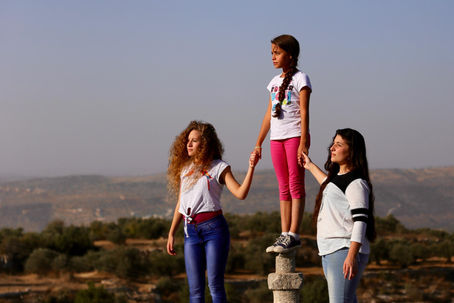West Bank village resists collective punishment
- Cynthia Wang
- Sep 27, 2016
- 3 min read

“Kids have to pass three checkpoints and roadblocks guarded by soldiers to reach schools. Sometimes they lose one or two classes just because it took too long to pass through,” the leader of the local council, Muwaffiq, told the Palestine Monitor.
For months, the Israeli army enclosed the West Bank village of Hizma in response to what they accused the residents of inciting violence and stone-throwing against soldiers in the area.
The main road was blocked entirely from July 28 for almost one month. Residents had to carry IDs inside the village preparing to be checked by soldiers anytime. Non-residents and commodity-supplied vehicles were denied access to pass. Soldiers even stopped them from entering the mosque during Ramadan.
“They came so early in the morning and didn’t let us go to the mosque for our Fajr prayer,” said Aia, a 17-year-old girl from the village. “They throw tear gas to us when we stay at home.”
“Even if you want to go to a supermarket to buy groceries or to a falafel shop, they stopped you,” Aia added.
In some days, residents can wait in line for hours just to pass the checkpoints.
“The economic situation here is deteriorating. People can’t go to their work easily if they do outside the village. They (soldiers) stop us and our cars at checkpoints or anywhere. We never know when the road will be closed again. You just have to wait and wait,” Muwaffiq said.
This way of disturbing residents’ daily lives and economic activities has become a routine and systematic tactic from the Israeli army as a collective punishment to all residents when any incidents happened in the neighborhood.
In addition, commercial stores and gas station located on the main road were demolished in the past years; others have been threatened recently.
Since April 18, concrete barriers were set to block two of the three main entrances of the village. Even though the roadblocks were temporarily removed before Eid al-adha in mid September due to an agreement between the local council and the army, loads of concrete blocks have been piling up beside the roads.
“We can never know when they will come back or set another barriers, maybe today, maybe tomorrow,” told Issam, a volunteer and resident of Hizma.
“It is hard for young people who graduated from university to find a job here but going out of the village takes hours. It is impossible to go everyday like this,” Muwaffiq added. He reminded the main street was once closed for 25 days, and all commercial activities were stopped in December 2015.
“We have no jobs here. After they built the Wall, we lost our land and everything. We are just trapped.”

According to Independent Youth Forum’s monthly report in July, the commercial profit and village residents’ incomes have deteriorated and dropped at least 70% since the segregation Wall was built in 2002. Unemployment rate has risen, and the recent blockade did not make the situation any better.
Furthermore, as 90% of Hizma’s land was classified as Area C by the Oslo Accords, residents are facing difficulties to access their agricultural land.
However, lands in Area B have been continuously confiscated illegally by the Israeli authorities to build the Wall, bypass roads and the Neve Ya'akov, Pisgat Ze'ev and Pisgat Amir settlements - where more than 70,000 settlers are currently living.
Many homes were demolished and wreckages are still everywhere to be found in the village.
And it does not stop here. From the view overlooking from the top of Hizma mountain, it is clear that the expansion of the Wall and settlements is nibbling away like a silkworm.
“The Wall will eventually surround all our village and road,” Issam said.
The route of the Wall has also disrupted the right to visit relatives as twelve families were segregated outside the village and forced to live beside or between settlers.
“The only way we can do now is to stay where we are and keep our homes.The local council is now seeking helps from international legal groups, although not so much has been done so far. We are still living under the worst situation of occupation,” concluded Muwaffiq.

This article was published on the online news website "the Palestine Monitor" in Palestine.




Comments